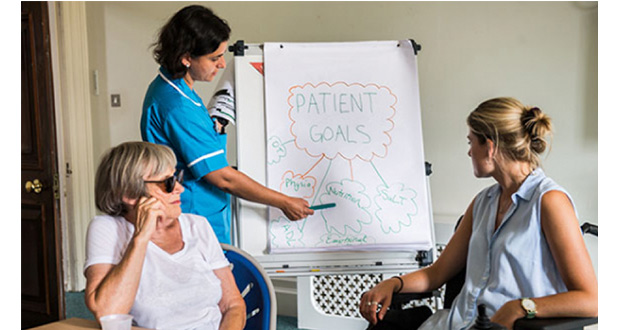Improved NHS Care For Parkinson’s, Multiple Sclerosis And Motor Neurone Disease To Save 2,500 Hospital Trips
 People living with brain and nerve conditions like Parkinson’s could benefit from quicker diagnosis and better coordinated care as part of a new NHS initiative, which is also set to free up millions of pounds to reinvest in patient care.
People living with brain and nerve conditions like Parkinson’s could benefit from quicker diagnosis and better coordinated care as part of a new NHS initiative, which is also set to free up millions of pounds to reinvest in patient care.
NHS experts have joined forces with seven leading charities, including Sue Ryder, to produce a toolkit that will help local health groups improve services for people with conditions including multiple sclerosis (MS), motor neurone disease (MND) and Parkinson’s disease, including rolling out fast-tracked blood tests and consultant appointments over Skype for those who want them.
Up to 2,500 emergency admissions to hospital a year could be avoided for patients with these conditions as a result, with up to £10 million freed up to fund improved services.
About the new guidance
The new NHS RightCare Progressive Neurological Conditions Toolkit aims to help Clinical Commissioning Groups (CCGs) deliver faster diagnosis and treatment for progressive neurological conditions; better join up the different health professionals and organisations supporting each individual; and improve access to specialist physical and mental healthcare.
People will also be supported to better understand and manage their symptoms at home, and to take a more informed and active role in making decisions about the treatment they receive.
Created with Parkinson’s UK, MS Society, MS Trust, MND Association, Sue Ryder, MSA Trust and PSP Association, the guidance comes as local health groups are working with staff and communities to develop their plans to join up and improve care over the next five years, to deliver the benefits for patients set out in the NHS Long Term Plan.
A chance to “deliver better care closer to home”
“This is an opportunity for the NHS to work directly with patients and their families to deliver better care closer to home for the thousands of people with progressive neurological conditions,” said Dawn Chamberlain, Programme Director – Clinical Improvement at NHS England and NHS Improvement.
“As they work with staff, patients and stakeholders to implement the NHS Long Term Plan, this toolkit provides the information local health leaders need to understand how to deliver high-quality neurology services.
“Many areas are already providing high-quality care in line with best practice, and by supporting others to come up to the same standard, we can deliver faster, more joined-up and better care for thousands more people – supporting them to stay well in their own homes.”
NHS RightCare programme
The Progressive Neurological Conditions Toolkit is the latest publication from the NHS RightCare programme, which was set up to provide support to local CCGs to improve care in key areas, based on the best-available data, evidence and intelligence.
Alongside the best practice guidance, CCGs will receive extensive data on local performance compared with the highest performing areas nationally, and tailored support to improve their offer to patients.
We and the rest of the charities who have worked closely with the NHS RightCare team to develop the toolkit will continue to support efforts to see it implemented effectively, with the shared aim of improving care for everyone living with a progressive neurological condition in England.
“For too long, services have neglected progressive neurological conditions,” said Steve Ford, Chief Executive at Parkinson’s UK. “This is as dangerous as it is unjust, putting people at higher risk simply because of the kind of condition they have.
“We are urging all CCGs to work with charities and implement the new toolkit, so they can make the changes so desperately needed to reduce hospital admissions and unlock these vital cost savings.”
This toolkit is a “positive step”
“This new toolkit will help advise what action must be taken by the areas where the needs of people with neurological conditions are not being met,” said Sue Ryder’s Head of Influencing Elinor Jayne. “By joining up services, we are hopeful that people with these conditions will no longer fall through the gaps in services.
“Whilst this toolkit is a positive step, a national action plan for neurological conditions in England must be developed to address any failings in the system.
“This plan must cover all neurological conditions to ensure people can access the specialist help they need to lives as fully as p





